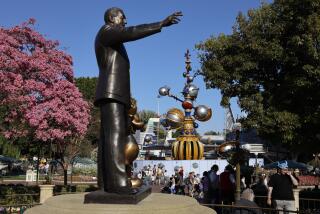American Indian Convicted in Theft of Whale Skull
An American Indian was convicted Thursday of stealing a whale skull from Crystal Cove State Park so tribal leaders in Los Angeles County could bless it.
Municipal Judge Martin Suits placed Louis Steven Maresca, 32, of Huntington Beach on probation for three years and ordered him to serve 40 hours of community service at the park.
Maresca said he was happy that he did not receive a jail sentence. But he maintained that he was merely trying to protect the skull of the gray whale, considered sacred to his Gabrielino tribe. The Gabrielinos once lived from Topanga Canyon to Aliso Creek.
“I didn’t intend to deprive them of the skull permanently because the last thing I wanted was to be called a thief,” Maresca said after the guilty verdict. “This entire trial shows how insensitive they are to our people and our culture.”
For the last six years, Maresca said, he has meditated at Crystal Cove, where Gabrielinos once roamed the rolling hills.
“It is my church away from the urban environment I live in,” he said. “When I’m there I feel like I’m back in contact with my culture.”
The 3,000-acre park between Laguna Beach and Corona del Mar includes sacred burial grounds and caves that contain Indian pictographs estimated to be 5,000 years old, said David Pryor, a supervisor with the state Department of Parks and Recreation.
Maresca said he often picks up empty beer cans and cleans graffiti near the caves. And he said mountain bikers have been “tearing up” parts of the park.
When he took the skull last June, Maresca said, he was overcome with emotion after listening to a cassette by John Trudell--an American Indian poet and activist--and seeing more beer cans and graffiti near the Gabrielinos’ holy grounds.
“It was running through my head how everything has been taken from us,” Maresca said. “When I saw the skull in a planter next to a trash can, it enraged me more. I decided to take it to the tribal council so that they could bless it and find out where it came from.”
Maresca did not get far. Park rangers who saw him take the skull radioed a report to their colleagues, who followed and stopped him in Newport Beach. They recovered the skull and told Maresca he would be charged with misdemeanor theft.
In a police report, park officials called the skull a semi-priceless museum artifact. Pryor said the skull came from a 20-foot yearling that washed up in Huntington Beach a few years ago. Rangers used it to teach visiting schoolchildren about whales.
The 100-pound skull was displayed on a table inside the courtroom during the two-day trial. Deputy Dist. Atty. Valerie Griswold, who prosecuted the case, said the skull would be returned to the state park.
Leaders of the Gabrielino tribe said they would like to see the skull returned to the ocean.
“The whale is very sacred to us,” said Vera Rocha, chairwoman of the Gabrielino band of Southern California Indians, based in Baldwin Park. “It is a symbol of motherhood. It needs to be returned to the sea.”
Rocha and other tribal leaders attended the trial to show their support for Maresca, a native Cree from North Dakota who was adopted into the Gabrielino tribe.
In addition to giving Maresca probation and community service, Suits fined him $191. “You are not my idea of a repeat offender,” the judge said. “You are a decent, sincere, . . . honest person.
“But when you find yourself overwhelmed with emotion, let it settle down,” Suits said. “The expression of ideas is tremendously important.”
Outside court, Maresca said he did not mind performing community service at the park. “I always want to go there,” he said. “I want to help protect my ancestors’ land.”
More to Read
Sign up for Essential California
The most important California stories and recommendations in your inbox every morning.
You may occasionally receive promotional content from the Los Angeles Times.










